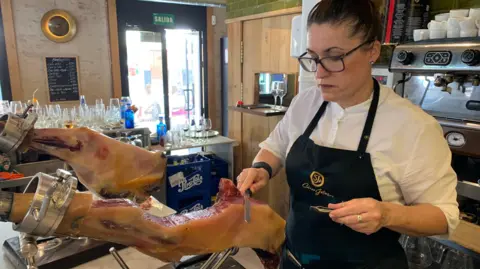The ongoing tariff turmoil between the United States and the EU has sent shockwaves through Spain’s flagship food sectors, particularly affecting the country’s iconic culinary exports such as jamón ibérico and olive oil. As discussions unfold in the political sphere, manufacturers and producers in Spain are seeking alternative markets to mitigate the adverse effects of impending tariffs.
In Seville, a bustling culinary hub in southern Spain, the atmosphere is rich with the aromas of traditional Spanish cuisine. The popular bar scene there captures a slice of Spanish culture, with staff serving refreshing cold beers alongside meticulously carved slices of jamón ibérico, Spain’s hallmark cured ham. This richly flavored ham has gained international fame for its unique, savory taste, lightweight yet savory characteristics, and the meticulous way it’s crafted from the Iberian pig, which roams free and exclusively feeds on acorns. With an annual export value of roughly €750 million (about $850 million), jamón ibérico represents a critical aspect of Spain’s food industry.
Jaime Fernández, who is the international commercial director for Grupo Osborne—an esteemed producer of wines and ham—considers jamón ibérico to be a pivotal part of Spain’s identity and cultural heritage. He expresses concerns over how recent tariffs imposed by U.S. President Donald Trump could jeopardize this culturally significant product, noting that the United States is a vital market for Spanish exports, undoubtedly impacting many stakeholders within the industry. The sudden introduction of a 20% tariff on all European imports in April has left producers on edge about future trade with the U.S., especially with Trump hinting at the potential for tariffs as steep as 50% if negotiations with the EU do not yield favorable results.
Fernández acknowledges the challenge these tariffs present to not only his company but the entire Spanish industry, emphasizing how they complicate financial planning and client relations. For Spain, which prides itself on its culinary prowess, these tariffs represent a serious threat to its identity as a supplier of premium food products on the global market.
While Spain’s overall economy seems robust, with the International Monetary Fund (IMF) projecting growth of around 2.5% this year, the impact of trade tariffs on one of its largest sectors—the pork industry, which supports more than 400,000 jobs—cannot be understated. The U.S. market has become increasingly critical for Spanish ham imports, evolving into the largest buyer outside the European Union. With looming price hikes due to tariffs, Spanish producers may struggle to compete with local products that are not subject to such charges, challenging their positioning within the U.S. market.
Similarly, the Spanish olive oil sector is encountering hardships, as it is the leading global producer of this staple ingredient. With the U.S. being a rapidly expanding market for olive oil, recent tariff regulations threaten to undo previous gains. Rafael Pico Lapuente, director-general of the Spanish Association of Olive Oil Exporters (ASOLIVA), highlights that olive oil imports to the U.S. have grown from 300,000 tonnes a decade ago to 430,000 tonnes. This growth trajectory could be significantly hampered by the tariff situation, making it increasingly complex for Spanish producers to maintain their foothold in the U.S. market.
The threats posed by tariffs, especially if inequitable trade laws differ by country, could lead to chaotic market relations, warns Javier Díaz-Giménez, a professor of economics at the IESE Business School in Madrid. He anticipates that Spanish products could be routed through neighboring countries with lower tariffs, leading to compliance challenges.
Despite extensive concerns, there are strategic shifts underway. Producers are actively considering diversifying their markets beyond the U.S. to regions like China and other parts of Europe. Fernández acknowledges that a 10% tariff might be manageable for his company; however, he emphasizes that any increase could compel a strategic withdrawal from the U.S. market and prompt investments elsewhere.
As the EU moves forward with negotiations to challenge these tariffs, the resolve of Spanish producers to adapt to changing circumstances becomes crucial. Stakeholders are holding their breath in anticipation of foreign trade negotiations, hoping that their gastronomic heritage and market viability remain intact amidst rising political and economic challenges. The dialogue around tariffs thus reflects broader themes of global trade and international relations, revealing the delicate balance between politics and culture in the business of food.



